By John Helmer, Moscow
![]() @bears_with
@bears_with
Among Russian oligarchs, Alexei Mordashov (lead image, centre) holds two records. One is for empty promises: he has never told the whole truth in public or when he has visited President Vladimir Putin (right) for private conversations about his business plans and the Russian state interest. Mordashov’s other record is for losing more money invested in the US than any other Russian; that was at least $3 billion in steelmills which Mordashov bought to turn himself into a global steelmaker in case his Severstal steel group was taken over at home.
It is therefore almost certain that when Mordashov flew to Cyprus last week to tell the Cyprus President Nikos Anastasiades (lead image, left) he intends to double the number of Russian tourists to Cyprus, it’s another empty promise. This is also the assessment of Russian and Cypriot tourism analysts.
Mordashov – translated from Russian his name means “gobface” — holds most of his fortune privately through offshore entities, so the Forbes estimate of his net worth at about $20 billion is guesswork, untestable in the marketplace. By the Forbes standard, Mordashov has been ranked fourth among Russian oligarchs; he trails rival steelmaker Vladimir Lisin (Novolipetsk Steel, NLMK), but he’s ahead of Alisher Usmanov (Metalloinvest), Roman Abramovich (Evraz), and Victor Rashnikov (MMK).
Mordashov’s Severgroup (Sever means north) is a holding of fifteen businesses ranging from steel, iron ore and coalmining to goldmining, timber, power engineering, supermarkets, and media. His steel story can be followed here. His Nordgold was a listed company in London until 2017; follow its fortunes. The Sveza group of timber processing companies was last analysed here.
Mordashov is on the US Treasury’s Russian oligarch list of February 2018. A few days earlier, his Power Machines company was sanctioned for its part in a joint venture with Siemens providing turbines to Crimea. Mordashov himself is not sanctioned.
The stock market opinion of Mordashov has been negative compared to his Russian steelmaking peers, and also compared to internationals in comparable lines of business.
MORDASHOV’S SHARE PRICE TRAJECTORY ON THE LONDON STOCK EXCHANGE COMPARED TO RUSSIAN RIVALS

CLICK ON IMAGE TO ENLARGE
All shares listed on the London Stock Exchange; price in USD. KEY: grey=Severstal; green=Novolipetsk Steel; yellow=Magnitogorsk Metallurgical Co. MMK; orange=Evraz. Source: https://markets.ft.com

CLICK ON IMAGE TO ENLARGE
Nord Gold shares, representing just over 10% of the company’s capital, were listed on the London Stock Exchange as Global Depositary Receipts in 2012 until they were de-listed at the start of 2017. The reason given by the company was that Nordgold “believed its market capitalisation did not accurately reflect the true value of the company”. The chart shows the share price in Euros. Source: https://www.investing.com/
Mordashov has made a habit of going to the Kremlin when he wants a favour, although the details don’t usually become public until later. Mordashov’s request for Putin’s endorsement of his attempted takeover of the European steelmaker Arcelor in May 2006 was a case of hubris and insufficient cash, and can be read here. In the following three years Mordashov went on to spend, then lose several billion dollars in buying US steel assets, which he operated in the red and was then forced to sell at a severe loss. If Putin disapproved the waste of money and favour, this isn’t recorded.
The first report on Noddy playing Mordashov with Putin at the Kremlin is now ten years old.
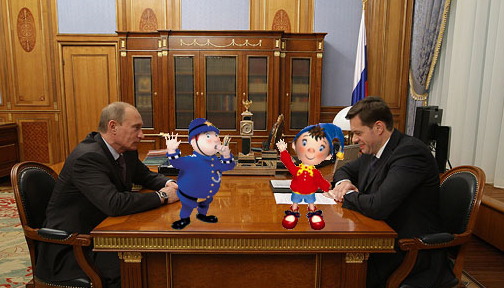
President Putin first met Mordashov on May 16, 2006, purportedly to discuss the supply of steel pipes to the first Nord Stream gas pipeline under the Baltic Sea to Germany: http://en.kremlin.ru/e In fact, the meeting was to discuss Mordashov’s $2.7 billion pitch for state support to become the largest steelmaker in Europe with a takeover of Arcelor of Luxembourg. That deal failed, as reported here. For the full series of Mordashov as Noddy in steel, gold and iron-ore mining, and plywood, read this.
The last Kremlin meeting on record between Putin and Mordashov occurred on February 21, 2018. They were cocking a snook at the Washington sanctions of several days earlier. Once again, Putin claimed to be keen on the quality of Severstal’s steel pipes, and Mordashov pretended to be a philanthropist. “We continue implementing our social programmes,” he told the President. “Last year, we invested some 2.5 billion rubles in supporting children, Russian North museums, and so on. We try to contribute to the social development of the regions where we have our facilities, because we know that it will be very difficult to implement the important social projects underway there without our support. We carry on our investment programme. We know that we must live up to the requirements of our clients in Russia. Overall, we invested 34 billion rubles in our Russian assets last year.”
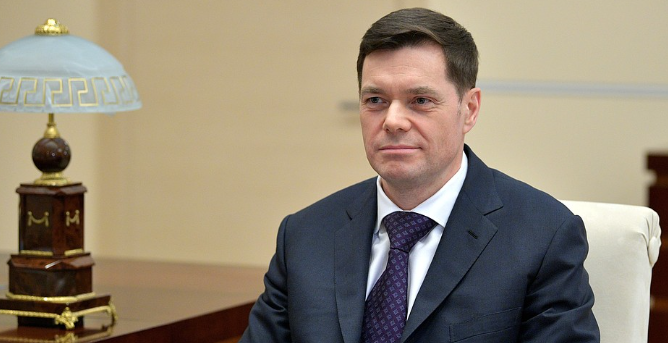
Mordashov at the presidential dacha at Novo-Ogaryovo, February 21, 2018.
Russian sources claim he and the President also discussed Mordashov’s offshore investments, including his 25% stake in TUI, the European tourism company; despite the year-long collapse in TUI’s share price Mordashov’s holding is currently worth about €1.4 billion.
The sources believe Mordashov had already promised the Kremlin that TUI would help boost tourism into Crimea. In fact, TUI’s spokesman in Moscow, Olga Ivanova, says the company doesn’t operate at all in Crimea. In its official announcements TUI Russia exports Russians to other destinations; it says nothing about Crimea. Deterrence by the US appears to be one reason.
Last year Mordashov accused the US Treasury of unfairly discriminating against his Power Machines for its participation in a joint venture which sold power turbines to Crimea. “In this JV we have 35 percent and Siemens has 65 percent, and the management of the JV is fully controlled by Siemens,” Mordashov told Reuters at the time.
“It is Siemens’ technology, Siemens’ turbines, Siemens’ design… But the [US] Department of State has no problem with Siemens, nothing even with the JV, and yet everything is against Power Machines, although it has no executive power in this JV. We have to review seriously our participation in this JV. It does not create a lot of benefits for us and it creates a lot of problems. Most probably we will have to review it substantially and withdraw from the JV.”
Mordashov’s punchline had already been discussed with Putin. “We never asked for funding or subsidies and we are not asking for any types of subsidies in this case. What we are asking for is very simple – because free market conditions for Power Machines were substantially undermined by the sanctions, we are asking the government to help us to restore the level playing field.”
For TUI to fly or ship European tourists to Crimea, and invest in Crimean hotel upgrades, is a risk Mordashov has been unwilling to run. Nor is any European Union tourism source.
Mordashov began investing in the Hanover-based TUI in 2007. In 2009 TUI took a 45% stake in the joint venture with Mordashov, TUI Russia. Together, the partners invested $40 million in the joint venture to acquire 75% of the Russian tour holding VKO Group; 75% of the Ukrainian tour operator Voyage-Kiev; and 75% of the tour operator Mostravel. Subsequently, TUI and Mordashov became the sole owners of tour operator assets which they marketed under the TUI brand. Then the US sanctions war started.
In 2015 TUI announced it was cutting its stake in TUI Russia to 25%; last December TUI reduced its position to just 10%. Mordashov held his stakes through two Cyprus entities, Unifirm and Togebi. According to Russian financial reports, his Russian incorporated units ran a Rb1.2 billion [$21 million] loss in 2017. TUI financial reports for Togebi also show loss-making in both 2017 and 2018:
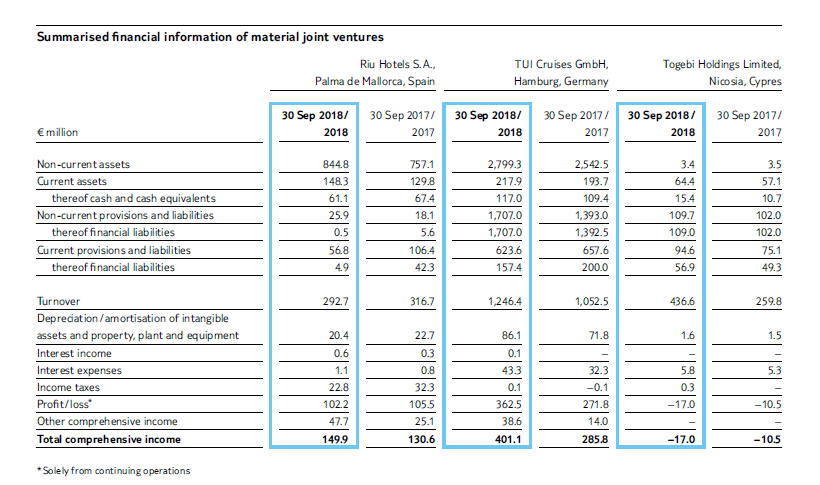
CLICK ON IMAGE TO ENLARGE
Currency in Euros. Source: https://www.tuigroup.com/ -- page 199.
TUI’s annual report for 2018, released on December 13, 2018, confirms that Mordashov owned 24.998% of the group shares as of last September 30. Although Mordashov is a member of the 21-seat Supervisory Board, he attended just four of the board meetings last year – the worst attendance record of any of the board members. Still, he took €187,000 in remuneration, the sixth largest board payoff.
This year, according to Moscow press reports, Mordashov began moving his shares in TUI through Unifirm to two of his teenage sons, Nikita and Kirill, through an entity called KN-Holding in which the children hold 50%. The purpose of the transfer was reportedly to give them business experience. They are also beneficiaries of transfer of part of their father’s shares in Nordgold.
In Crimea, tourist arrivals, according to this year’s statistics, January through August, from the Crimean Ministry of Tourism, have reached 5.8 million; this is up 11% on last year. Of this total, 27% arrived by air; 58% by car over the new Crimean bridge; and 15% across the Perekop isthmus.
For TUI in Russia, however, the priority is Cyprus. This at least is what Mordashov told President Anastasiades when Mordashov travelled to Nicosia last week. According to a TUI press release, “the share of TUI in the inbound organized tourist flow [Cyprus] is 19%. In 2020, we plan to increase this figure to 45-50% and send about 268,000 tourists to Cyprus, taking into account the markets of Russia, Belarus, Estonia, Latvia, and by 2021, to increase the tourist flow to Cyprus to 500,000 tourists a year.”
Mordashov’s visit, he and Russian media reports claim, “is also a sign that TUI Russia’s plans are to increase substantially the flow to Cyprus even though it is recording a decline these days. This is due to strong competition from neighbouring countries. The flow from Russia to Cyprus fell by 3.2% between January and August this year compared with the same period in 2018. So far, the total number of Russian tourists to Cyprus this year numbered 534,600 compared to 552,400 last year. In 2017, the number of arrivals reached 462,000. TUI Russia brings about 80,000 Russian tourists to Cyprus annually, according to the latest data, but the goal is for that number to rise to 250,000. And the ultimate goal is to reach half a million by 2023.”
There is a Russian press release and photograph of the meeting with Anastasiades on September 17; there is no presidential tweet.

Left to right: Mordashov; Anastasiades; and Taras Demura, chief executive of TUI Russia. Also attending was Savvas Perdios, deputy minister of tourism for Cyprus.
“The attractiveness of Cyprus as a tourist destination for travelers from all over the world, and especially for Russians, is beyond doubt,” Mordashov is reported to have said. “It is important that the leadership of Cyprus flexibly responds to the changes that the tourist market is undergoing today due to new trends, the development of modern technologies. I am sure that for such countries as Cyprus this is the the future of tourism, and I see great prospects for the development of our cooperation.” What Mordashov meant by telling Anastasiades he wants “flexible resoponse” isn’t reported. When Mordashov has asked Putin for the same thing, he’s meant financial benefits.
A local tourism ministry source close to Perdios says Mordashov and TUI Russia want the ministry to provide them with a “marketing contribution” of between €30 and €50 per tourist if they deliver the promised increase in numbers. In Brussels the European Union regards this as a a state subsidy which is not allowed.
Also quoted in the Russian report of the presidential meeting was Demura. “By 2021, we expect to increase the volume of tourist flow to Cyprus to 500,000 tourists a year. The plans are ambitious, but we have all the prerequisites for their implementation.”
“Nikos Anastasiades supported the proposals of Alexei Mordashov to expand cooperation,” the Russian side reported. “Appropriate instructions were given to the relevant Ministry of the Republic of Cyprus.” It is unclear how serious Anastasiades is, since he and the Greek Prime Minister, Kyriacos Mitsotakis, have already agreed with US officials in Washington to reduce all elements of Cyprus’s relationship with Moscow. For details, read this.
Russian tourism industry sources in Cyprus and Moscow are also skeptical of the future for Russian tourism to the island. Turkey, not Cyprus, is the preferred Mediterranean destination for Russian tourists.

Source: https://russtd.com/analytics/ and https://russtd.com/
Cyprus sources say Russian numbers on the island have now peaked; they don’t believe that TUI Russia can lift the peak to 500,000. According to a Cyprus tourism industry executive: “Tourism to the island needs saving – with Brexit, British numbers are in decline. Thomas Cook is now out of business. Compared to Turkey, Cyprus has a difficult tourism product — low quality but higher costs. The biggest Russian tour operators favour Turkey and Egypt. For higher priced tourism Greece comes next.”
Another Cypriot tourism executive points out that because TUI has no airline of its own, to increase the flow of Russians to Cyprus Mordashov will have to depend on Turkish-owned flight operators like Azur Air, as well as Turkish-owned tour operators in Russia, Tez and Anex. “Their priority is Turkey, Thailand, Egypt or even Greece. In the past even the Mouzenidis Group wasn’t able to open Cyprus for Russians. Biblio Globus managed to succeed at a time when Cypriot hotels were offering dumping rates and were cheaper than Turkey. For nearly ten years Biblio Globus owned Cyprus. Nearly 80% of [Russian] tourists came through them. Transaero was their carrier. Then Biblio Globus shifted to Turkey and Crimea, leaving dozens of Cyprus hotels unpaid. What does Mordashov have in Russian tourism? Nothing.”

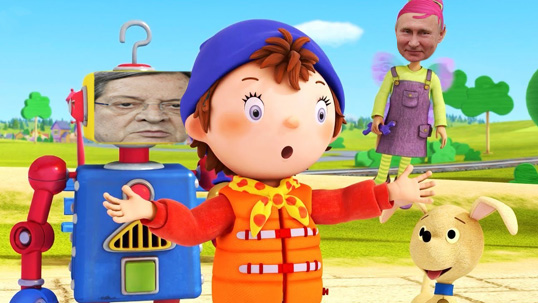
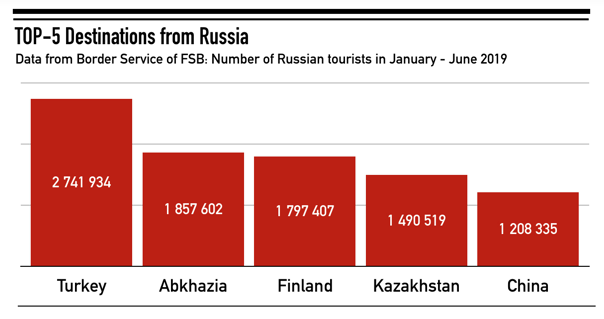










Leave a Reply